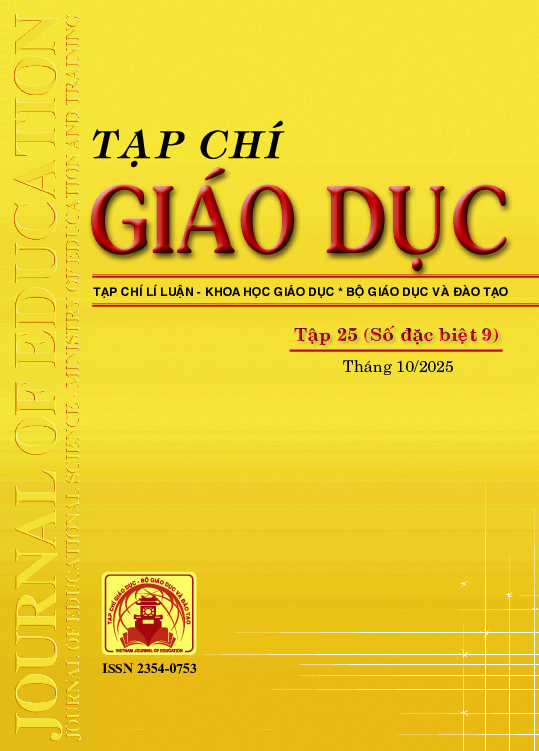Thực trạng và một số đề xuất phát triển văn hóa số trong các trường trung học cơ sở công lập tại huyện Bình Chánh, thành phố Hồ Chí Minh
Tóm tắt
In the context of digital transformation in education being strongly promoted by national orientations (Decision No. 749/QD-TTg and No. 131/QD-TTg), the formation and development of digital culture in secondary schools poses urgent requirements for a theoretical basis and practical evidence. This article describes the level of digital culture implementation according to the PDCA cycle in public secondary schools in Binh Chanh district and proposes measures suitable for the survey results. A mixed-methods design was employed to survey 578 managers and teachers at 18 schools, utilizing a 5- level Likert questionnaire, supplemented by interviews to verify the information. The results show that the digital culture components, according to the PDCA framework, have different levels of implementation: the core value system is assessed more positively, while learning culture and behavioral culture still reveal challenges. In the area of management culture, the "organization and implementation" stage is the point that needs priority improvement. On that basis, the study proposes five measures to develop digital culture according to the PDCA cycle (core values; management; teaching; learning; behavior), with implementation orientation and support conditions at the school level, contributing to providing an empirical reference framework for governance and management of digital transformation in local public secondary schools.
Tài liệu tham khảo
Bộ GD-ĐT (2022). Quyết định số 4725/QĐ-BGDĐT ngày 30/12/2022 về ban hành bộ chỉ số đánh giá mức độ chuyển đổi số của cơ sở giáo dục phổ thông và giáo dục thường xuyên.
Bray, M. (2022). Education and digital transformation: Challenges and opportunities. International Journal of Educational Technology, 29(4), 305-320.
Capgemini Digital Transformation Institute (2017). The digital culture challenge: Closing the employee-leadership gap. https://www.capgemini.com/fi-en/wp-content/uploads/sites/27/2018/09/dti-digitalculture_report_v2.pdf
Diễn đàn Kinh tế Thế giới (2021). Four elements of a strong digital culture. Diễn đàn Kinh tế Thế giới.
Đỗ Đình Thái (2020). Một số vấn đề liên quan đến phát triển văn hóa nhà trường trong Trường Đại học Sài Gòn. Tạp chí Khoa học Giáo dục Việt Nam, 26, 36-41.
Giang Quốc Khánh (2023). Văn hóa số trong doanh nghiệp Việt Nam: Thực tiễn và thách thức. Tạp chí Quản lí Doanh nghiệp, 15(1), 78-89.
Gonzales, F. (1978). Ice Berg Graphic Organizer, Mexican American Culture in the Bilingual Education Classroom (Unpublished doctoral dissertation). The University of Texas at Austin.
Hội đồng Quốc gia Chỉ đạo biên soạn Từ điển Bách khoa Việt Nam (2003). Từ điển Bách khoa Việt Nam. NXB Từ điển Bách khoa.
Ishikawa, K. (2022). Fundamental quality management and the application of the PDCA cycle. International Management Publishing.
Microsoft (2017). Digital culture: Definitions and components for success. Microsoft Corporation.
Nguyễn Đặng Phương Truyền (2023). Vai trò của văn hóa số trong quản lí công vụ. Tạp chí Quản lí Nhà nước, 9(3), 102-115.
Nguyễn Thị Kim Chi, Phạm Hoàng Giang (2021). Tầm quan trọng của văn hóa số trong trường trung học cơ sở. Tạp chí Công nghệ và Giáo dục Việt Nam, 28(2), 80-95.
Nguyễn Thị Ngọc Phương, Đỗ Đình Thái (2018). Một số lí luận về phát triển văn hóa nhà trường. Tạp chí Giáo dục, số đặc biệt tháng 8, 64-68.
Okasha, M. (2023). Digital culture and its impact on organizational success. Cambridge University Press.
Thủ tướng Chính phủ (2020). Quyết định số 749/QĐ-TTg ngày 03/6/2020 về phê duyệt chương trình chuyển đổi số quốc gia đến năm 2025, định hướng đến năm 2030.
Thủ tướng Chính phủ (2022). Quyết định số 131/QĐ-TTg ngày 25/01/2022 về tăng cường ứng dụng công nghệ thông tin và chuyển đổi số trong giáo dục và đào tạo giai đoạn 2022-2025, định hướng đến năm 2030.
Ủy ban Thường vụ Quốc hội (2025). Nghị quyết số 1685/NQ-UBTVQH15 ngày 16/6/2025 về việc sắp xếp các đơn vị hành chính cấp xã của Thành phố Hồ Chí Minh năm 2025.
Viện Ngôn ngữ (2003). Từ điển tiếng Việt. NXB Đà Nẵng.
Đã Xuất bản
Cách trích dẫn
Số
Chuyên mục
Giấy phép

Tác phẩm này được cấp phép theo Ghi nhận tác giả của Creative Commons Giấy phép quốc tế 4.0 .












